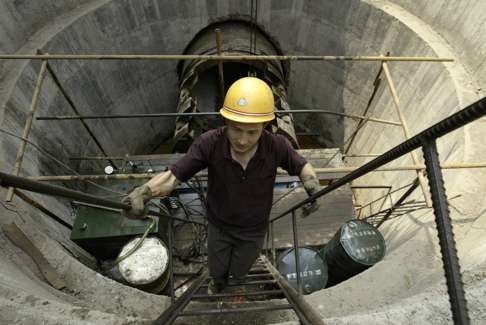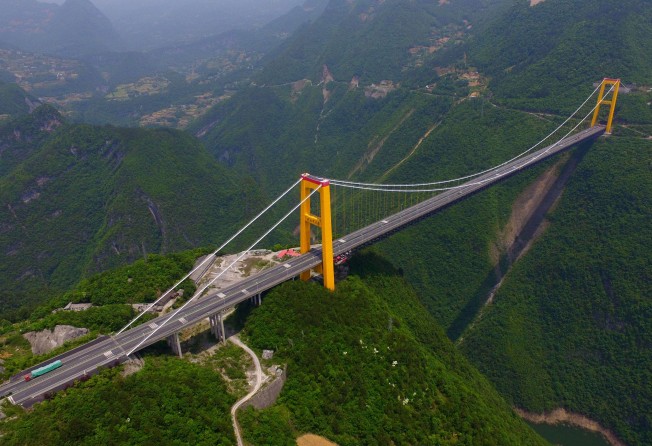
PPP projects likely to move faster after early ABS issues win green light
Infrastructure projects will benefit as private developers can build projects without increasing local government debt burden

Mainland regulators will for the first time let public private partnership (PPP) projects raise funds through asset-backed securities (ABS) within just two years, which market players believe can attract more private capital into the government-led infrastructure projects.
Private companies now can exit PPP projects as early as two years into their operations, compared with the wait of more than a decade previously.
“Many PPP projects have an operation cycle of 20 to 30 years. In the past, private investors have limited ways to cash in and exit. That has dampened their interest in investing in PPP,” said Hu Xiaohe, managing director at the investment banking arm of China Merchants Securities in Shenzhen.
“Now private companies are propelled to improve operation and meet the [cash flow] standard, so as to collect the money back quickly through ABS and reinvest in other projects,” Hu said.
In a PPP private companies bid for and take over public projects – such as bridge or road – from local governments. Companies seek long-term profits through building and operating such projects.
The China Securities Regulatory Commission and National Development and Reform Commission on Monday said in a joint statement that they encouraged traditional infrastructure PPP projects, which had been operating for at least two years with stable cash inflow, to raise funds by issuing ABS products.
An ABS comprises assets such as corporate loans, income receivables or infrastructure charges. Credit rating focuses more on the assets than the issuers.

The government has promoted PPP over the past two years to boost domestic infrastructure investment without putting indebted local governments under more capital pressure.
Zhongtai Securities analyst Yang Tao wrote in a research note: “Long investment cycle, large investment amount and limited capital liquidity have been major problems that restricted the expansion of China’s PPP scheme.” ABS products could largely solve such problems.
Hu from CMS said: “Both the local governments and private companies will benefit.”
By the end of September, China had 10,471 PPP projects under its official PPP scheme, with 1.25 trillion yuan (HK$1.39 trillion) . Of these 26 per cent had been taken over by private firms and construction had begun, according to the website of China Public Private Partnerships Centre under the finance ministry.
Analysts expect to see a higher rate of construction after the policies came into force.
Hu said: “PPP backed ABS is quite similar to infrastructure-related ABS. It’s either backed by receivables of local governments or the infrastructure charges of the project. Practically we think its easier to securitise the infrastructure charges because they are stable cash flows."
Hu said PPP projects for highway, rail systems, underground pipe systems, or environment-related projects like sewage treatment and waste incineration, were most likely to be much in demand in future.
According to the joint statement, each provincial NDRC office would nominate one to three PPP projects for ABS by the end of February 17.
Analysts from China International Capital Corporation said in a research note: “Some PPP-backed ABS products may be seen in the first half.”
Zhongtai’s Yang said the stronger-than-expected policy showed the Chinese government, especially the central economic planner NDRC, was determined to maintain stable domestic economic growth.
“[Domestic economy] will still be the key [for growth] as the Sino-US trade situation turns grim after Donald Trump was elected as the US president,” Yang said.
Coupon rate for infrastructure ABS was around 3.5 per cent to 8 per cent this year
Infrastructure investment, along with foreign trading and domestic consumption, are the major driving forces for China’s economic growth.
CICC said that the increase of PPP-backed ABS products would help drag down the coupon rate for infrastructure-backed ABS and lower the financing cost for China’s construction companies who issue ABS for financing.
“The capital liquidity for ABS is not very good so the interest rate is usually high. Coupon rate for infrastructure ABS was around 3.5 per cent to 8 per cent this year. Some of them have surpassed the bank’s lending rate,” CICC said.
“There is a large room for further growth of ABS in China,” CICC said, given the ABS market in the United States was approaching US$2 trillion.
China’s ABS market has seen explosive growth in the past three years as regulators gave a green light to the structured finance tool in 2012. ABS had been suspended during the financial crisis following a debut in 2005.
By December 26, there were 796 ABS products issued in the mainland market with an accumulative issuance of 1.63 trillion yuan, according to Wind Information. The 92 infrastructure charges-backed ABS made up 5.37 per cent of total issuance.